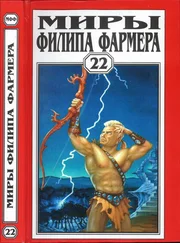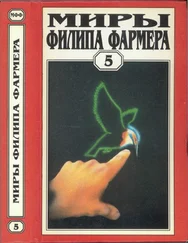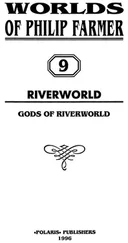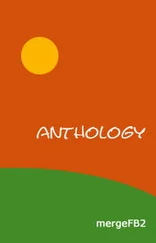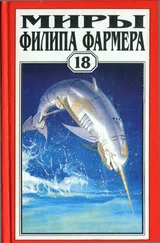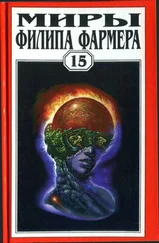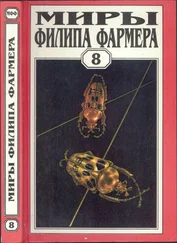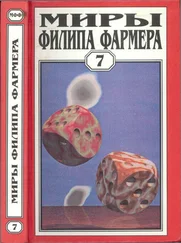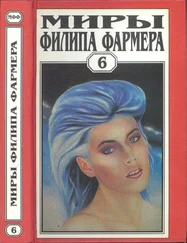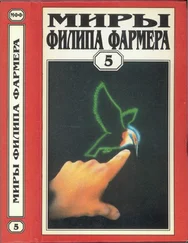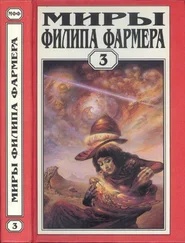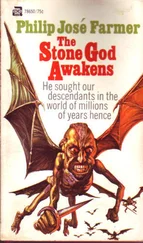Филип Фармер - The Lovers
Здесь есть возможность читать онлайн «Филип Фармер - The Lovers» весь текст электронной книги совершенно бесплатно (целиком полную версию без сокращений). В некоторых случаях можно слушать аудио, скачать через торрент в формате fb2 и присутствует краткое содержание. Жанр: Фантастика и фэнтези, на английском языке. Описание произведения, (предисловие) а так же отзывы посетителей доступны на портале библиотеки ЛибКат.
- Название:The Lovers
- Автор:
- Жанр:
- Год:неизвестен
- ISBN:нет данных
- Рейтинг книги:5 / 5. Голосов: 1
-
Избранное:Добавить в избранное
- Отзывы:
-
Ваша оценка:
- 100
- 1
- 2
- 3
- 4
- 5
The Lovers: краткое содержание, описание и аннотация
Предлагаем к чтению аннотацию, описание, краткое содержание или предисловие (зависит от того, что написал сам автор книги «The Lovers»). Если вы не нашли необходимую информацию о книге — напишите в комментариях, мы постараемся отыскать её.
The Lovers — читать онлайн бесплатно полную книгу (весь текст) целиком
Ниже представлен текст книги, разбитый по страницам. Система сохранения места последней прочитанной страницы, позволяет с удобством читать онлайн бесплатно книгу «The Lovers», без необходимости каждый раз заново искать на чём Вы остановились. Поставьте закладку, и сможете в любой момент перейти на страницу, на которой закончили чтение.
Интервал:
Закладка:
The sentient species on Abaka'a'tu, the northern land mass, had been, until five hundred years ago, the wogglebug. On Siddo it had been a remarkably human-looking animal. There Homo ozagen had developed a culture at a stage analogous to that of ancient Egypt or Babylon. And then almost all the humans, civilized or savage, had perished.
This had happened only a thousand years before the first wogglebug Columbus had landed on their great continent. At the time of the discovery and for two centuries after, the wogs had presumed that the indigenes were extinct. But, as the wog colonists began penetrating the jungles and mountains of the interior, they encountered a few small groups of humanoids. These had retreated into the wilderness, where they could hide as successfully as the African pygmies had hidden before the great rain forests were cut down. It was estimated that there might be a thousand, maybe two thousand, scattered over an area of 100,000 square kilometers.
A few specimens, all males, had been captured by the wogs. Before releasing them, the wogs had learned their languages. They'd also tried to find out why the humanoids had so suddenly and mysteriously disappeared. Their informants had explanations, but these were contradictory and of obvious mythical origin. They just did not know the truth, though it might be concealed in their myths. Some explained the catastrophe as a plague sent by the Great Goddess or All-Mother. Others said she had sent a horde of demons to wipe out her worshippers because they had sinned against her laws. One story had it that she had shaken loose the stars so that they fell on all but a few of the people.
In any event, Yarrow did not have all the data he needed for his study. The linguist on the first expedition had had only eight months to gather his data, and a good part of that had been spent teaching several wogs American before he could really get started. The ship had stayed ten months on Ozagen, but for the first two months the crew had remained aboard while robots collected atmospheric and biota specimens, which were analyzed to make sure that the Terrans could venture forth without being poisoned or stricken by disease.
Despite all precautions, two had died of insect bites, one had been killed by a peculiar form of predator, and then half of the personnel had been stricken with a very debilitating but not fatal disease. This was caused by a bacterium which was innocuous to the natives but which had mutated in the bodies of its non-Ozagen hosts.
Fearing that other diseases might occur, and being under orders to make only a survey, not a thorough exploration, the captain had ordered a return to home. The personnel has been quarantined for a long time on a satellite station before they were allowed to touch Earth again. The linguist had died a few days after the landing.
While the second ship was being built, a vaccine for the disease was prepared. And other collected bacteria and viri were tested on animals and then on human beings who had been sent to H. This had resulted in a number of vaccines, some of which had made the crew of the Gabriel sick.
For some reason known only to the hierarchy, the captain of the first ship had been disgraced. Hal thought that this could be because he had failed to get samples of the blood of the natives. From what little Hal had learned, and this was only through some rumors, the wogs had just refused to allow their blood to be taken. Perhaps, this was because the suspicious behavior of the Haijacs had infected the wogs. When the Terrestrial scientists had then asked for corpses to dissect – for purely scientific reasons, of course – the wogs had again refused. All of their dead, they claimed, were cremated and their ashes strewn on the fields. It was true that they were often dissected by their own doctors before cremation, but it was part of their religion that this be done ritually. And a wog physician-priest had to perform it.
The captain had considered abducting some wogs just before the takeoff. But he'd felt that it wouldn't be wise to antagonize them at this time. He knew that a second expedition in a much larger vessel would be sent to Ozagen after he'd made his report. If its biologists couldn't talk the wogs into supplying blood samples, then force would be used.
While the Gabriel was being built, a top-echelon linguist had read the notes and listened to the recordings of his predecessor. But he'd spent too much time in trying to make comparisons with various aspects of Siddo to those of Terran languages, dead or alive. Where he should have been setting up a system by which the crew could learn Siddo in the quickest manner, he'd indulged his scholarly inclinations. Maybe this was the reason he wasn't going on the ship. Hal didn't know. He'd been given no explanation of why he was a last-minute substitute.
So Hal swore and bent to his work. He listened to the sounds of Siddo and studied their waveforms on the oscilloscope. He labored at reproducing them with his un-Ozagenian tongue, lips, teeth, palate, and larynx. He worked on a Siddo-American dictionary, an essential which his predecessor had somewhat neglected.
Unfortunately, before he or any of his crew mates could become fully conversant in Siddo, its native speakers would be dead.
Hal worked six months, long after all but the skeleton crew had gone into the suspensor. What annoyed him most about the project was the presence of Pornsen. The gapt would have gone into deep freeze, but he had to stay awake to watch Hal, to correct any unreal behavior on his part. The only redeeming feature was that Hal did not have to talk to Pornsen unless he felt like it, because he could use the urgency of his work as an excuse. But he tired of it after a while and of the loneliness. Pornsen was the most available human being to talk to, so Hal talked to him.
Hal Yarrow was also among the first to come out of the suspensor. This, he was told, was forty years later. Intellectually, he accepted the statement. But he never really believed it. There was no change in the physical appearance of himself or his shipmates. And the only change outside the ship was in the increased brightness of the star that was their destination.
Eventually, the star became the brightest object in the universe. Then, the planets circling it became visible. Ozagen, the fourth from the star, loomed. Approximately the size of Earth, it looked – from a distance – exactly like Earth. The Gabriel slipped into orbit after feeding data into the computer. For fourteen days, the vessel whirled around the planet while observations were made from the Gabriel itself and from gigs which descended into the atmosphere and even made several landings.
Finally, Macneff told the captain to take the Gabriel down.
Slowly, using immense quantities of fuel because of her vast mass, the Gabriel eased into the atmosphere and toward Siddo, the capital city, on the central-eastern coast. It settled gently as snowfall toward an open stretch in a park in the heart of the city. Park? The entire city was a park; the trees were so plentiful that from the air Siddo looked as if only a few people lived in it, not the estimated quarter of a million. There were many buildings, some ten stories high, but they were so widely separated they did not make an aggregate impression. The streets were wide, but they were overgrown by a grass so tough it could withstand any amount of wear. Only on the busy harbor front did Siddo resemble anything like an Earth city. Here the buildings were clustered close together, and the water was packed with sail ships and paddle-wheeled steamboats.
Down came the Gabriel while the crowd that had gathered below it ran to the borders of the meadow. Its colossal gray bulk settled upon the grass and at once began imperceptibly sinking into the soil. The Sandalphon, Macneff, ordered the main port opened. And, followed close behind by Hal Yarrow, who was to assist him if he stumbled in his speech to the welcoming delegation, Macneff stepped out into the open air of the first habitable planet discovered by Earthmen.
Читать дальшеИнтервал:
Закладка:
Похожие книги на «The Lovers»
Представляем Вашему вниманию похожие книги на «The Lovers» списком для выбора. Мы отобрали схожую по названию и смыслу литературу в надежде предоставить читателям больше вариантов отыскать новые, интересные, ещё непрочитанные произведения.
Обсуждение, отзывы о книге «The Lovers» и просто собственные мнения читателей. Оставьте ваши комментарии, напишите, что Вы думаете о произведении, его смысле или главных героях. Укажите что конкретно понравилось, а что нет, и почему Вы так считаете.

